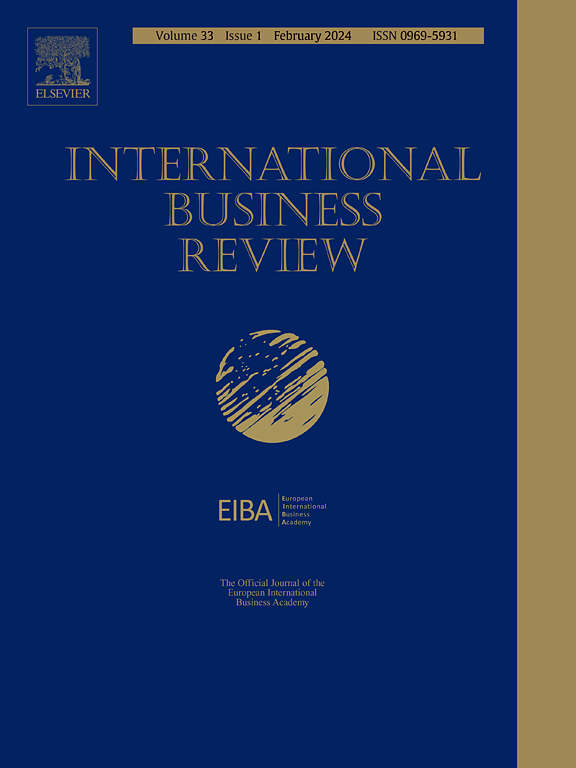Does deglobalization imply the end of global supply chains?
IF 6.1
1区 管理学
Q1 BUSINESS
引用次数: 0
Abstract
Deglobalization, the process through which economic agents are increasingly severing their international economic links and relocating economic activity toward their domestic economies, has been affecting supply chains spanning the globe. In the face of major economic and political challenges, companies have always been redesigning their networks through which inputs are sourced, products are manufactured, and customer demand is satisfied. While the literature has addressed the traditional complexities arising from market volatility, cost differentials and emerging technologies, further guidance is needed on the impact of government policies for companies operating on a global scale. It is therefore necessary to identify the forces that drive deglobalization and understand how they shape the evolution of global supply chains. Anchored on the global value chain framework from macroeconomics, political science, international business, and operations management, we construct and validate systems dynamics models to assess the evolution of global supply chains where decisions taken at the macro and strategic levels would act as constraints or enablers at the tactical level. We observe that, independent from any other forces, the landed cost advantage, which was the principal driver of offshoring decisions, gets eroded over time through both higher competition and convergence of wages. Moreover, as competition shifts towards higher responsiveness, offshored facilities find themselves at a greater disadvantage. Political pressure in terms of tariffs and sanctions as well as management control in terms of ownership restrictions and the challenges in enforcing the rule of law reduce the attractiveness of offshoring. The rate at which offshoring decisions are reversed, however, depends on the complexity of both the manufacturing asset and the sophistication of the local ecosystem. Finally, political pressure does not necessarily lead to reshoring; nearshoring, the transfer of manufacturing facilities to a territory closer to the final market, emerges as a viable alternative. In short, these findings signal a slow transition from global to regional supply chains. As a result, supply chain professionals and policy makers are urged to adopt a broader perspective that incorporates the impact of operational, strategic, and geo-political parameters on the entire supply network in their decision or policy making processes. Going forward, emerging technologies and sustainability considerations will continue setting the boundary conditions within which global supply chains will continue to evolve.
去全球化是否意味着全球供应链的终结?
经济主体越来越多地切断其国际经济联系并将经济活动转移到国内经济的过程,即去全球化,已经影响到全球的供应链。面对重大的经济和政治挑战,公司一直在重新设计他们的网络,通过这些网络来获取投入、制造产品和满足客户需求。虽然文献已经解决了由市场波动、成本差异和新兴技术引起的传统复杂性,但需要进一步指导政府政策对全球范围内运营的公司的影响。因此,有必要确定推动去全球化的力量,并了解它们如何塑造全球供应链的演变。以宏观经济学、政治学、国际商务和运营管理的全球价值链框架为基础,我们构建并验证系统动力学模型,以评估全球供应链的演变,其中宏观和战略层面的决策将在战术层面发挥约束或推动作用。我们观察到,独立于任何其他力量,土地成本优势,这是离岸决策的主要驱动因素,随着时间的推移,通过更高的竞争和工资的趋同而受到侵蚀。此外,随着竞争转向更高的响应能力,离岸设施发现自己处于更大的劣势。关税和制裁方面的政治压力以及所有权限制方面的管理控制和执行法治方面的挑战降低了离岸外包的吸引力。然而,离岸外包决策被逆转的速度取决于制造资产的复杂性和当地生态系统的复杂性。最后,政治压力不一定会导致回流;近岸,即将生产设施转移到更接近最终市场的地区,成为一种可行的替代方案。简而言之,这些发现表明,全球供应链向区域供应链的转变正在缓慢进行。因此,供应链专业人士和政策制定者被敦促在决策或政策制定过程中采用更广阔的视角,将运营、战略和地缘政治参数对整个供应网络的影响纳入其中。展望未来,新兴技术和可持续性因素将继续为全球供应链的发展设定边界条件。
本文章由计算机程序翻译,如有差异,请以英文原文为准。
求助全文
约1分钟内获得全文
求助全文
来源期刊

International Business Review
BUSINESS-
CiteScore
14.10
自引率
6.90%
发文量
95
审稿时长
62 days
期刊介绍:
The International Business Review (IBR) stands as a premier international journal within the realm of international business and proudly serves as the official publication of the European International Business Academy (EIBA). This esteemed journal publishes original and insightful papers addressing the theory and practice of international business, encompassing a broad spectrum of topics such as firms' internationalization strategies, cross-border management of operations, and comparative studies of business environments across different countries. In essence, IBR is dedicated to disseminating research that informs the international operations of firms, whether they are SMEs or large MNEs, and guides the actions of policymakers in both home and host countries. The journal warmly welcomes conceptual papers, empirical studies, and review articles, fostering contributions from various disciplines including strategy, finance, management, marketing, economics, HRM, and organizational studies. IBR embraces methodological diversity, with equal openness to papers utilizing quantitative, qualitative, or mixed-method approaches.
 求助内容:
求助内容: 应助结果提醒方式:
应助结果提醒方式:


